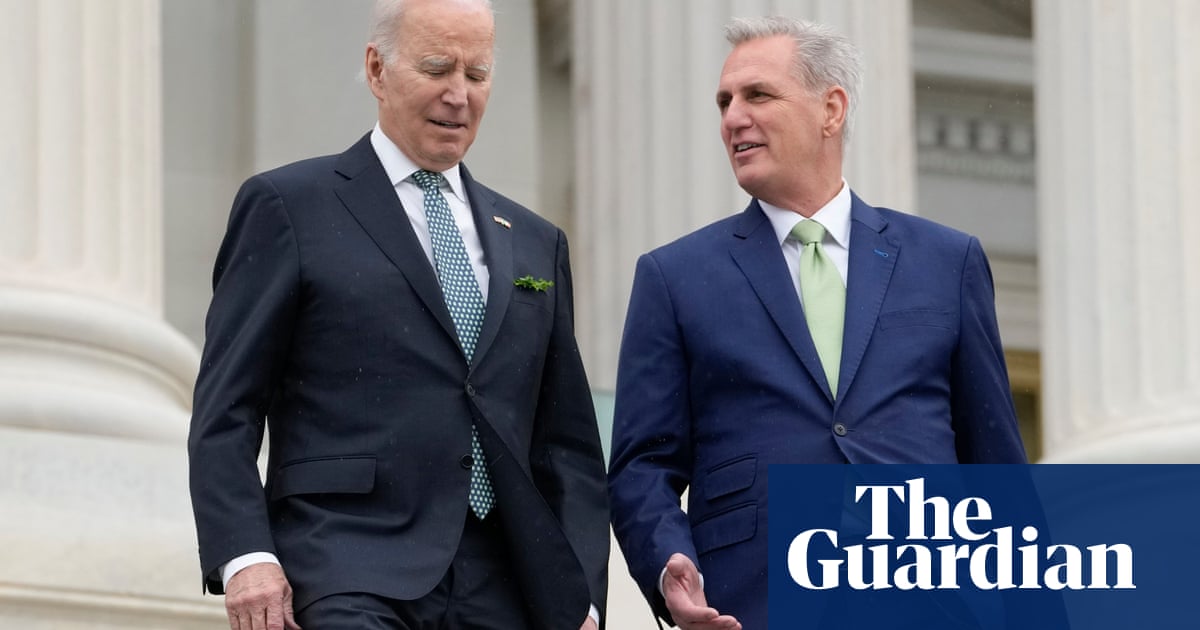

Amid warnings about looming fiscal catastrophe, the GOP is attempting to use Biden’s climate agenda as a bargaining chip over raising the debt ceiling – even if it could hurt Republican voters.
Late last month, House Republicans narrowly passed speaker Kevin McCarthy’s proposal to raise the government’s debt ceiling in exchange for sweeping cuts to federal spending.
Known as the Limit, Save, Grow Act, the proposal – which is unlikely to progress through the Democrat-majority Senate and which the president says he would veto – would eliminateBiden’s student loan forgiveness plan and claw back pandemic relief spending. It would also repeal most of the new renewable energy tax incentives codified in the Inflation Reduction Act.
“Republicans unfortunately are not allowing government to function as intended,” said Mark Paul, a professor of economics at Rutgers University.
All but six Senate Republicans on Saturday promised to oppose raising the debt ceiling “without substantive spending and budget reforms”, supporting McCarthy’s position. Biden is set to meet with McCarthy on Tuesday.
The Inflation Reduction Act dedicated $369bn to climate and renewable energy policies, constituting the largest down payment on climate policy in US history. But the GOP proposal would gut the majority of those provisions.
The McCarthy bill would repeal the $4,000 credits for used vehicles and phase out some of the $7,500 credits for new EVs, remove tax breaks for building solar panels and other clean energy infrastructure, and put an array of other climate incentives on the chopping block. RL Miller, president of the advocacy group Climate Hawks Vote and a member of the Democratic National Committee, called it a “hostage situation”.
“I am screaming at the top of my lungs for climate people who don’t normally get that into debt ceiling fights … to get involved in this one,” she said.
The proposal was also originally set to eliminate incentives for the production of corn ethanol, but members of the Republican caucus from the midwest, where corn used to make ethanol is grown, successfully fought to preserve those provisions.
The proposed cuts could help McCarthy curry favor with the far-right wing of his party. But if passed, the measure would come at great cost to Republican voters. The Financial Times last month found that red congressional districts have secured five times more funding for clean energy projects from the Inflation Reduction Act than blue districts; Politico found that two-thirds of the major renewable energy projects announced from the spending bill’s passage through January 2023 were slated for Republican-led districts. The result would be the loss of more than 77,000 clean energy jobs across 72 Republican-held districts, according to a recent report by the environmental advocacy organization Climate Power.
“People in red states, in particular, need to be aware that their representatives are acting counter to their own economic interests,” said Miller.
McCarthy also slipped a GOP proposal to speed energy permitting into his debt ceiling bill. Known as HR 1, the measure, which passed the House in March, would expedite the federal approval of energy projects and limit states’ ability to reject them, while buttressing domestic fossil fuel production.
Among the “most egregious” provisions: a plan to repeal a fee that the Inflation Reduction Act imposed on emissions of methane – a greenhouse gas that is 80 times more planet-warming than carbon dioxide in the short term – from oil and gas operations, said Michelle Deatrick, head of the Democratic National Committee’s Council on the Environment and Climate Crisis.
after newsletter promotion
“That’s the low-hanging fruit of the climate crisis, the thing that we need to do now without delay,” she said. “And it is also something that we know how to reduce quickly.”
If Congress can’t reach an agreement on the debt ceiling and the US defaults on its debts, Paul said the effects would be cataclysmic.
“We’re talking about catastrophic global financial systems that will make 2008 look like a bump in the road in comparison,” he said. “This would be economic apocalypse.”
In that scenario, he said, the US could bring climate spending to a halt. But there’s no reason for Biden to entertain that possibility, he said, because he has the ability to unilaterally end the debate by instructing the US Treasury to mint a single trillion-dollar coin or issue premium bonds.
US officials warn that the climate crisis poses an existential risk to the US financial system – one that will require massive spending to avert. Studies show that delayed climate action will only increase costs in the future.
“We have Republicans essentially saying, ‘Well, in order to put the US economy on better ground, we need to cut climate spending,’” said Paul, “which is just talking about shooting yourself in the foot.”
 Print
Print




